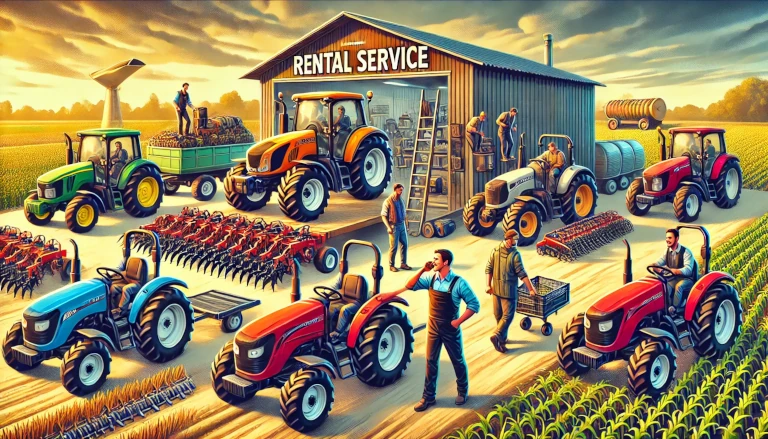Agri-Equipment Rental is a service that allows farmers to rent agricultural machinery and tools for a specified period rather than purchasing them outright. This innovative solution has gained popularity, especially among small and marginal farmers, due to the high cost of purchasing modern farming equipment. Renting agricultural machinery enables farmers to access advanced technology, improve productivity, and reduce operational costs. This guide explores the benefits, challenges, financial aspects, and marketing strategies involved in starting and managing an agri-equipment rental business.
What is Agri-Equipment Rental? 🚜
Agri-equipment rental refers to the practice of renting out farm machinery and tools, such as tractors, harvesters, seed drills, and irrigation pumps, to farmers for temporary use. The service bridges the gap between the need for advanced farming technology and the financial constraints of purchasing expensive equipment.
Commonly rented agri-equipment includes:
- Tractors: Essential for plowing, planting, and hauling.
- Combine Harvesters: For efficient harvesting and threshing.
- Seed Drills: For precise planting.
- Rotavators and Tillers: For soil preparation.
- Irrigation Pumps: To support water management.
Why Choose Agri-Equipment Rental?
The agri-equipment rental business offers several benefits to farmers and entrepreneurs alike:
- Cost-Effective: Farmers can access modern machinery without the burden of high capital investment.
- Increased Productivity: Advanced equipment enables faster and more efficient farm operations.
- Flexibility: Farmers can rent specific tools for seasonal tasks, reducing the need for year-round ownership.
- Encourages Technology Adoption: Renting makes high-tech equipment accessible to small-scale farmers.
Getting Started with an Agri-Equipment Rental Business 🛠️
Starting an agri-equipment rental service requires careful planning and investment. Follow these steps to launch your business:
- Conduct Market Research: Identify the equipment needs of farmers in your target region. Focus on high-demand tools like tractors, harvesters, and irrigation systems.
- Acquire Equipment: Invest in quality machinery that meets the needs of local farmers. Consider starting with versatile equipment such as tractors and multipurpose implements.
- Set Up a Rental System: Establish a transparent rental process, including pricing, rental periods, and agreements. Offer flexible terms to attract more customers.
- Choose a Location: Set up your rental business near farming communities to ensure accessibility.
- Provide Maintenance Services: Offer regular servicing to keep equipment in top condition and extend its lifespan.
- Educate Farmers: Conduct workshops or demonstrations to familiarize farmers with operating and maintaining rented equipment.
Challenges of Agri-Equipment Rental ⚠️
While profitable, the agri-equipment rental industry faces several challenges:
- High Initial Investment: Purchasing equipment requires significant capital.
- Maintenance Costs: Machinery must be serviced regularly to prevent breakdowns, which can be costly.
- Logistical Issues: Transporting equipment to and from farms can be challenging, especially in remote areas.
- Seasonal Demand: Most equipment is required during peak farming seasons, leading to periods of underutilization.
Financial Requirements 💰
Investment Breakdown
- Equipment Purchase: Initial costs depend on the type and quantity of equipment. Tractors and harvesters typically require higher investment.
- Storage Facilities: Secure storage is needed to protect machinery when not in use.
- Transportation Costs: Include vehicles for delivering equipment to farms.
- Marketing and Outreach: Allocate funds for advertising your rental service in local farming communities.
Profit and Loss Analysis
- Profit Potential: Rental rates are typically 10-15% of the equipment’s value per use, making the business profitable over time.
- Breakeven Period: Most agri-equipment rental businesses recover their initial investment within 2-3 years.
- Risk of Losses: Losses can occur due to equipment damage, theft, or periods of low demand.
Marketing and Sales Strategy 🛒
A strong marketing strategy is key to attracting customers to your agri-equipment rental service. Here’s how to promote your business effectively:
- Partner with Farmer Cooperatives: Collaborate with local farming cooperatives to increase visibility and reach.
- Use Digital Platforms: Advertise your rental service on social media and agricultural websites to reach a wider audience.
- Offer Discounts and Promotions: Provide introductory discounts or bundle deals to encourage first-time renters.
- Organize Demonstrations: Host live demos at local fairs or villages to showcase the benefits of using modern equipment.
Targeted Customers 🎯
Primary customers for agri-equipment rental services include:
- Small and Marginal Farmers: Farmers with limited capital who need cost-effective solutions.
- Farming Cooperatives: Groups that pool resources to rent machinery collectively.
- Agricultural Contractors: Individuals offering farm services who require equipment temporarily.
- NGOs and Government Programs: Organizations supporting sustainable farming initiatives often collaborate with rental services.
Benefits of Agri-Equipment Rental 🌍
- Affordable Access: Makes high-tech farming equipment accessible to small-scale farmers.
- Improved Efficiency: Boosts productivity and reduces manual labor for farmers.
- Supports Sustainable Practices: Enables efficient water use, soil preparation, and harvesting with minimal waste.
- Reduces Equipment Ownership Burden: Eliminates the costs of owning, storing, and maintaining equipment year-round.
Additional Considerations 📝
When to Start
Launching an agri-equipment rental business is best before the planting or harvesting seasons, as demand for machinery peaks during these times.
Location and Accessibility
Choose a central location close to farming communities. Easy accessibility increases the likelihood of rentals and ensures timely delivery of equipment.
Risk Management
- Insurance: Protect your equipment from theft, damage, and accidents.
- Regular Maintenance: Conduct preventive maintenance to minimize breakdowns and extend equipment life.
- Transparent Policies: Clearly define rental terms, penalties for damages, and late returns to avoid disputes.
Final Thoughts on Agri-Equipment Rental
Agri-equipment rental services are transforming the agricultural landscape by making modern farming tools accessible and affordable. With the right setup, marketing strategies, and maintenance practices, an agri-equipment rental business can be highly profitable while supporting sustainable farming practices. By addressing farmers’ needs and promoting advanced technology, you can build a thriving business that contributes to agricultural development.
Read this in Marathi at कृषी उपकरण भाडे व्यवसायासाठी मार्गदर्शक
Discover more from Green Ecosystem - Renewable Energy, Agriculture, and Environmental Sustainability
Subscribe to get the latest posts sent to your email.


